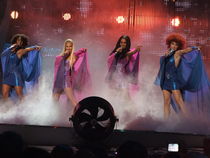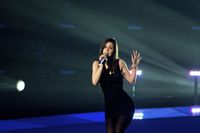Germany in the Eurovision Song Contest
| Germany | |
|---|---|
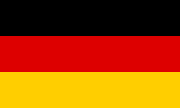
|
|
| Member station | NDR ARD |
| National selection events | Unser Star für (name of host city) (2010) |
| Appearances | |
| Appearances | 55 |
| First appearance | 1956 |
| Best result | 1st: 1982, 2010 |
| Worst result | Last: 1964, 1965, 1974, 1995, 2005, 2008 |
| External links | |
| NDR page | |
| Germany's page at Eurovision.tv | |
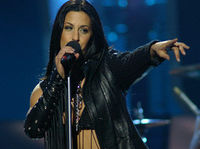
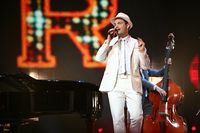
With the exception of 1996, Germany has participated in every Eurovision Song Contest since its beginning in 1956. No other country has been represented as often. France and the United Kingdom come in a close second, missing only two contests each. Before German reunification in 1990, it occasionally presented as West Germany, representing the Federal Republic of Germany. East Germany (the German Democratic Republic) did not compete.
Germany has won two contests, in 1982 and 2010. Although German contestants have had limited success compared to their neighbors, public interest remains high and the contest is one of the most watched events each year.
Germany, along with the United Kingdom, France and Spain, is one of the "Big Four" countries that are automatically qualified to the final, regardless of the placing. This is due to being the largest financial contributors to the contest. However it was reported that the "Big Four" could lose their status and have to compete in the semi-finals for the first time in the 2009 contest.[1] However this never progressed, and the "Big Four" will keep their status.[2]
The Eurovision Song Contest semi-final is broadcast on NDR Fernsehen, and the final is broadcast on Das Erste, the flagship channel of ARD.
In recent years Germany have been notable for their adoption of musical styles which are not typical of Eurovision, such as country and western (Texas Lightning – "No No Never" in 2006) and swing (Roger Cicero – "Frauen regier'n die Welt" in 2007 and Alex Swings Oscar Sings – "Miss Kiss Kiss Bang" in 2009).
Germany tied for last at the 2008 contest for points, but was awarded 23rd of 25th place when the results were posted. In 2009 ARD held an internal selection for the first time since 1995 due to lack of interest and viewing figures of the German national finals.[3] Alex Christensen and Oscar Loya were selected to represent Germany at the 2009 contest, where they performed on stage with famous burlesque artist Dita von Teese. However they only managed to receive 35 points, placing 20th of 25 competing countries.
In 2010 ARD approached former entrant and songwriter Stefan Raab and private network ProSieben to co-operate in finding an winning entry for the country. It has been said that Raab was approched due to his good record at the contest, finishing 5th in 2000 as well as writing entries in 1998 and 2004, which finished 7th and 8th respectively. Raab agreed and conducted a tv casting show called "Unser Star für Oslo" ("Our star for Oslo") which was broadcasted on ARD and ProSieben. A winner arose in Lena Meyer-Landrut with "Satellite", who went on to win the contest.
Contents |
1996 absence
ARD had selected an artist and song to represent them at the Eurovision Song Contest 1996, set to be held in Oslo, Norway. Due to the large number of countries wanting to compete at Eurovision, the EBU decided to use a pre-selection method to reduce the 30 countries wanting to compete down to 23. Unfortunately for Germany its entry, Leon with "Planet of Blue", failed to get enough points to progress to the final. ARD and the EBU were not happy with this, as Germany was the biggest financial contributor at the time. This was the only time that Germany was absent from the contest.
Germany and the "Big Four"
Since 1998, four particular countries have automatically qualified for the Eurovision final, regardless of their positions on the scoreboard in previous Contests.[4] They earned this special status by being the four biggest financial contributors to the EBU (without which the production of the Eurovision Song Contest would not be possible). These countries are the United Kingdom, Germany, France and Spain. Due to their untouchable status in the Contest, these countries became known as the "Big Four". Contest Executive Supervisor Svante Stockselius told reporters in a meeting with OGAE Serbia, that if Italy were to return to the contest in the future, that it would also qualify automatically for the finals, becoming part of a "Big Five". [5][6]
Contestants
| Year | Artist | Title | Place | Points |
|---|---|---|---|---|
| 1956 | Walter Andreas Schwarz | "Im Wartesaal zum großen Glück" | NA | NA |
| 1956 | Freddy Quinn | "So geht das jede Nacht" | NA | NA |
| 1957 | Margot Hielscher | "Telefon, Telefon" | 4 | 8 |
| 1958 | Margot Hielscher | "Für zwei Groschen Musik" | 7 | 5 |
| 1959 | Alice & Ellen Kessler | "Heute Abend wollen wir tanzen geh'n" | 8 | 5 |
| 1960 | Wyn Hoop | "Bonne nuit ma chérie" | 4 | 11 |
| 1961 | Lale Andersen | "Einmal sehen wir uns wieder" | 13 | 3 |
| 1962 | Conny Froboess | "Zwei kleine Italiener" | 6 | 9 |
| 1963 | Heidi Brühl | "Marcel" | 9 | 5 |
| 1964 | Nora Nova | "Man gewöhnt sich so schnell an das Schöne" | 13 | 0 |
| 1965 | Ulla Wiesner | "Paradies, wo bist du?" | 15 | 0 |
| 1966 | Margot Eskens | "Die Zeiger der Uhr" | 10 | 7 |
| 1967 | Inge Brück | "Anouschka" | 8 | 7 |
| 1968 | Wencke Myhre | "Ein Hoch der Liebe" | 6 | 11 |
| 1969 | Siw Malmkvist | "Primaballerina" | 9 | 8 |
| 1970 | Katja Ebstein | "Wunder gibt es immer wieder" | 3 | 12 |
| 1971 | Katja Ebstein | "Diese Welt" | 3 | 100 |
| 1972 | Mary Roos | "Nur die Liebe läßt uns leben" | 3 | 107 |
| 1973 | Gitte | "Junger Tag" | 8 | 85 |
| 1974 | Cindy & Bert | "Die Sommermelodie" | 14 | 3 |
| 1975 | Joy Fleming | "Ein Lied kann eine Brücke sein" | 17 | 15 |
| 1976 | Les Humphries Singers | "Sing Sang Song" | 15 | 12 |
| 1977 | Silver Convention | "Telegram" | 8 | 55 |
| 1978 | Ireen Sheer | "Feuer" | 6 | 84 |
| 1979 | Dschinghis Khan | "Dschingis Khan" | 4 | 86 |
| 1980 | Katja Ebstein | "Theater" | 2 | 128 |
| 1981 | Lena Valaitis | "Johnny Blue" | 2 | 132 |
| 1982 | Nicole | "Ein bißchen Frieden" | 1 | 161 |
| 1983 | Hoffmann & Hoffmann | "Rücksicht" | 5 | 94 |
| 1984 | Mary Roos | "Aufrecht geh'n" | 13 | 34 |
| 1985 | Wind | "Für alle" | 2 | 105 |
| 1986 | Ingrid Peters | "Über die Brücke geh'n" | 8 | 62 |
| 1987 | Wind | "Laß die Sonne in dein Herz" | 2 | 141 |
| 1988 | Maxi & Chris Garden | "Lied für einen Freund" | 14 | 48 |
| 1989 | Nino de Angelo | "Flieger" | 14 | 46 |
| 1990 | Chris Kempers & Daniel Kovac | "Frei zu leben" | 9 | 60 |
| 1991 | Atlantis 2000 | "Dieser Traum darf niemals sterben" | 18 | 10 |
| 1992 | Wind | "Träume sind für alle da" | 16 | 27 |
| 1993 | Münchener Freiheit | "Viel zu weit" | 18 | 18 |
| 1994 | Mekado | "Wir geben 'ne Party" | 3 | 128 |
| 1995 | Stone & Stone | "Verliebt in Dich" | 23 | 1 |
| 1997 | Bianca Shomburg | "Zeit" | 18 | 22 |
| 1998 | Guildo Horn | "Guildo hat euch lieb!" | 7 | 86 |
| 1999 | Sürpriz | "Reise nach Jerusalem – Kudüs'e seyahat" | 3 | 140 |
| 2000 | Stefan Raab | "Wadde hadde dudde da?" | 5 | 96 |
| 2001 | Michelle | "Wer Liebe lebt" | 8 | 66 |
| 2002 | Corinna May | "I Can't Live Without Music" | 21 | 17 |
| 2003 | Lou | "Let's Get Happy" | 11 | 53 |
| 2004 | Max | "Can't Wait Until Tonight" | 8 | 93 |
| 2005 | Gracia | "Run & Hide" | 24 | 4 |
| 2006 | Texas Lightning | "No No Never" | 14 | 36 |
| 2007 | Roger Cicero | "Frauen regier'n die Welt" | 19 | 49 |
| 2008 | No Angels | "Disappear" | 23 | 14 |
| 2009 | Alex Swings Oscar Sings | "Miss Kiss Kiss Bang" | 20 | 35 |
| 2010 | Lena Meyer-Landrut | "Satellite" | 1 | 246 |
| 2011 |
- In 1996 Germany failed to qualify to the contest from the pre-qualification round.
Voting history (1975–2010)
Germany traditionally gives high marks to Turkey, which could be due to the large Turkish minority living in the country. Germany has received most points from the Iberian Peninsula (Spain and Portugal).
Germany has given the most points to...
| Rank | Country | Points |
|---|---|---|
| 1 | 162 | |
| 2 | 146 | |
| 3 | 122 | |
| 4 | 115 | |
| 4 | 115 |
Germany has received the most points from...
| Rank | Country | Points |
|---|---|---|
| 1 | 181 | |
| 2 | 147 | |
| 3 | 141 | |
| 4 | 138 | |
| 5 | 131 |
NOTE: The totals in the above tables include only points awarded in Eurovision finals, and not the semi-finals since 2004.
Hostings
| Year | Location | Venue | Presenter |
|---|---|---|---|
| 1957 | Großer Sendesaal des Hessischen Rundfunks | Anaïd Iplicjian | |
| 1983 | Rudi-Sedlmayer-Halle | Marlene Charell | |
| 2011 | TBA | TBA | TBA |
References
- ↑ Murray, Gavin (2008-05-28). "Big 4 (France; Germany; Spain; United Kingdom): May lose automatic place in Eurovision final". ESCToday. http://www.esctoday.com/news/read/12025. Retrieved 2008-09-13.
- ↑ Viniker, Barry (2008-09-14). "Eurovision 'Big Four' final spots confirmed". ESCToday. http://www.esctoday.com/news/read/12281. Retrieved 2008-09-14.
- ↑ Floras, Stella (2008-12-16). "Germany: No national final for 2009". ESCToday. http://www.esctoday.com/news/read/12704. Retrieved 2009-05-26.
- ↑ O'Connor, John Kennedy (2005). The Eurovision Song Contest 50 Years The Official History. London: Carlton Books Limited. ISBN 1-84442-586-X.
- ↑ http://www.oikotimes.com/v2/index.php?file=articles&id=234
- ↑ Fulton, Rick (2007-05-14). "The East V West Song Contest". Daily Record. http://www.dailyrecord.co.uk/news/editors-choice/2007/05/14/the-east-v-west-song-contest-86908-19098830/. Retrieved 2009-05-24.
External links
- Eurovision official website
- Eurovision Club Germany
- OGAE Germany
- German ESC official website
- Points to and from Germany eurovisioncovers.co.uk
|
||||||||
|
|||||||||||
